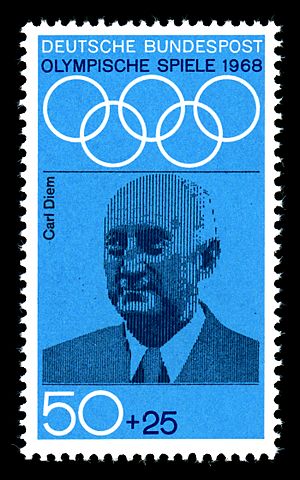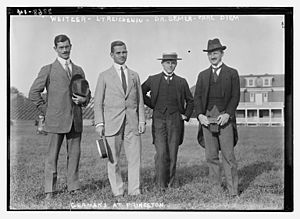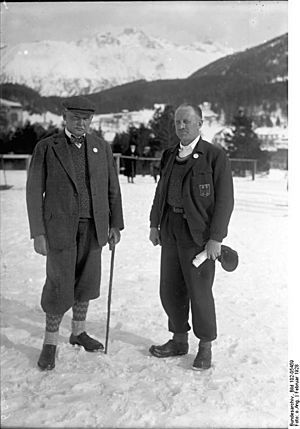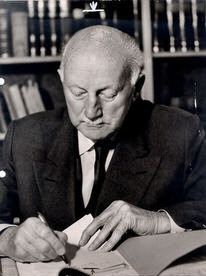Carl Diem facts for kids
Carl Diem (born June 24, 1882, in Würzburg – died December 17, 1962, in Cologne) was a German sports leader. He was the main organizer of the 1936 Summer Olympic Games in Berlin.
Diem is famous for starting the Olympic torch relay tradition. He organized the first relay for the 1936 Games. He was also an important historian of sports, especially the Olympic Games.
Contents
Carl Diem's Life in Sports
Carl Diem grew up in a well-off family. As a teenager, he enjoyed running long distances. This was unusual because gymnastics was more popular in Germany at the time. He was good at organizing things from a young age. In 1899, he started his first sports club called Marcomannia.
Diem first worked in sales, but he also wrote articles for sports newspapers. When he was 20, the German Sports Authority hired him. A year later, he joined their board of directors. Diem strongly believed that international sports could help countries get along. He was a big fan of Pierre de Coubertin, who started the modern Olympic Games.
Early Olympic Work
Diem began his Olympic journey in 1906. He led the German athletes to the games in Athens. In 1909, Berlin was chosen to host the 1916 Summer Games. Diem worked hard to prepare for these games. His main partner was Theodor Lewald, who led the German Olympic Committee for many years.
In 1912, Diem started the German Sports Badge. This award encouraged people to be active, similar to an award he saw at the Stockholm Olympics.
World War I and Beyond
In 1914, World War I started, and the 1916 Berlin Games were cancelled. Diem joined the German army and fought in Belgium and France. He was injured but recovered and continued to serve.
After the war, Germany was not allowed to compete in the 1920 and 1924 Olympics. Diem and Lewald worked hard to get Germany back into the games. They succeeded, and Germany competed in the 1928 games in Amsterdam. Diem also started a school for sports science called the Deutsche Hochschule für Leibesübungen.
In 1929, Diem visited the United States. He admired American sports programs. During this trip, he became friends with Avery Brundage, an American Olympic official. Brundage would later play a big part in the 1936 Olympics.
The Berlin Olympics
In April 1931, Berlin was chosen to host the 1936 Summer Games. This was largely thanks to Diem and Lewald's efforts. Diem became the main organizer for the event. He went to the 1932 Games in Los Angeles to learn from their preparations. He wanted Berlin to do even better.
When Adolf Hitler came to power in 1933, Diem's dream of the Berlin Olympics was at risk. The new government did not initially support international sports. However, Theodor Lewald convinced Joseph Goebbels, a powerful minister, that the Olympics would be a great way to promote Germany. Goebbels then convinced Hitler to support the games.
Hitler decided that the German government would pay for the games. This meant much more money than Diem had first planned. New sports facilities were built, and the train system was extended to the stadium.
Challenges for Diem
Even with official support, Diem's job was not completely safe. This was because his sports school employed Jewish teachers. Also, Diem's wife, Liselott, came from a Jewish family. Despite these challenges, Diem managed to keep his position.
Some American Olympic officials were worried about how Jewish athletes would be treated. They considered boycotting the Berlin Games. Diem's friend, Avery Brundage, came to Berlin to investigate. Diem convinced Brundage that Jewish athletes would not be excluded. Brundage then helped ensure that the American team would attend the games.
Some Jewish athletes were allowed to compete. For example, Rudi Ball played hockey in the Winter Games, and Helene Mayer won a silver medal in fencing at the Summer Games. However, many Jewish Germans were still excluded from public life.
Diem continued to hold important positions in German sports even after the 1936 Olympics. He managed German athletes abroad. He even helped get the 1940 Winter Olympics planned for Germany again. However, these games were cancelled when Germany invaded Poland.
The Olympic Torch Relay
The Olympic torch relay is a famous tradition. Many people think it is an ancient custom, but it was actually created by Carl Diem and Theodor Lewald. They thought of the idea during a trip to Greece in 1934. They wanted to connect the modern games in Germany with the ancient Greek Olympics.
The ancient games had a sacred flame, but no torch relay. Diem had organized long-distance running relays since 1910, so he knew how to plan such an event.
The First Relay
On June 30, 1936, the first Olympic flame was lit in Olympia, Greece. It was lit in the ruins of the Temple of Hera. Young women, dressed in robes, used a special mirror to focus the sun's rays.
The flame was then carried by runners in a relay race. It traveled 3,422 kilometers (about 2,126 miles) to the Olympic stadium in Berlin. Each runner carried the flame for one kilometer.
The flame passed through several countries on its way to Berlin. These included Bulgaria, Yugoslavia, Hungary, Austria, and Czechoslovakia. Within ten years, all these countries would be under German control.
The event was filmed by a famous director, Leni Riefenstahl. Big German companies helped with the relay. The mirrors for lighting the flame were made by Zeiss. The torches were made by Krupp, a large steel company.
The final runner, Fritz Schilgen, carried the flame into the stadium on August 1. He lit the Olympic cauldron to start the games. Schilgen was chosen for his graceful running style. Diem was with Hitler at the opening ceremony. Diem's five-year-old daughter, Gudrun, presented Hitler with flowers.
The tradition of the torch relay from Greece to the host country has continued at every Olympic Games since then. The way the flame is lit in Olympia, Greece, is still almost the same.
Carl Diem's Legacy
In March 1945, as World War II was ending, Diem gave a speech in Berlin's Olympic stadium. He spoke to thousands of young people, encouraging them to defend the city.
After the war, Diem continued his work in sports. He became a respected figure again in Germany. He was the director of the Berlin University Physical Education Department. He also became the head of a new National Sport College in Cologne.
Diem continued his career as a historian of German sport and the Olympic Games. In 1960, he published a well-known history of sport. He died in 1962 in Cologne. The Carl Diem Institute was created in his honor at the German Sports University. His wife, Liselott, ran it until 1989. After her death, it was renamed the Carl and Liselott Diem Archive. Diem is still seen as a very important sports historian in Germany.
Controversies
Carl Diem's relationship with the Nazi government is complex. He worked in sports for many years before the Nazis came to power. He was chosen to organize the 1936 games before Hitler decided to use them for propaganda.
However, like many people who worked under the Nazi government, Diem's reputation was affected. He held important positions during that time. He also took part in war propaganda, including the rally near the end of the war. Some researchers have found documents suggesting his involvement with the Nazis was deeper than he admitted.
After the war, there was debate about Diem's connections to the Nazis. For example, in 1954, a gymnastics display in France was postponed because students called Diem a "Nazi general." Later, the students said there was no formal proof of this. In the 1990s, there was a public discussion in Germany about whether streets named after him should be renamed. In 1948, the International Olympic Committee (IOC) did not allow him to become a member.
See also
 In Spanish: Carl Diem para niños
In Spanish: Carl Diem para niños
 | Dorothy Vaughan |
 | Charles Henry Turner |
 | Hildrus Poindexter |
 | Henry Cecil McBay |





